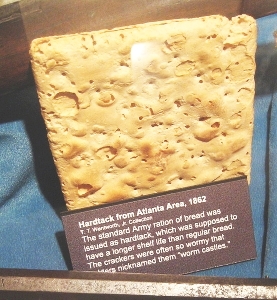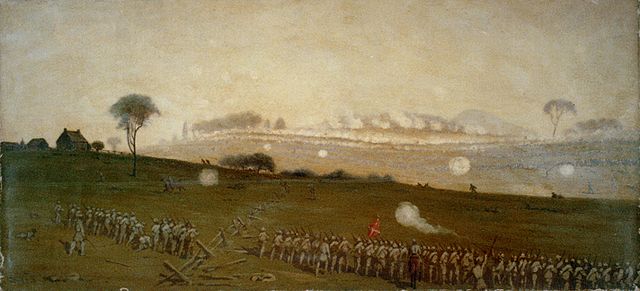The diet of soldiers fighting in the Civil War was most likely high in calories, but low in vitamins. Fresh fruits and vegetables were hard to come by when an army was on the march. Constant rations of salt beef, beans, coffee, and hardtack could jeopardize a soldier’s health. Both Yankee and Rebel soldiers would often forage the countryside for fresh vegetables and fruit to round-out their diets.
Salt beef (also called salt horse) was a standard army ration during the Civil War. It was pickled beef preserved in very strong salt brine. The soldiers had to soak the salt beef in water to get rid of the salty brine before they could cook and eat it. The pickling process would often fail and moldy, rancid, salt beef was common.Hardtack was a typical item in the diet of both Billy Yanks and Johnny Rebs. Hardtack was a quarter-inch thick square of baked unleavened flour. The soldiers often joked about hardtack. One joke the soldiers told was that the only protein in their diet came from the worms found in the hardtack.Recipe For Hardtack
Here is a recipe for that common Civil War food, hardtack. This is only one of many hardtack recipes to be found.
Ingredients:
- 4 cups of flour
- 2/3 cup of shortening
- 2 teaspoons of salt
- 1 cup of water
Instructions:
- Preheat your oven to 400 degrees Fahrenheit.
- Combine flour and salt, begin mixing in shortening a little at a time. Use the mixer on medium setting. Add more water or salt as needed, to obtain a similar consistency to Playdough.
- Roll the Hardtack dough into a thickness of about 1/2 inch.
- Cut dough into squares of 3 inches by 3 inches by 1/2 inch.
- Poke 16 holes into each biscuit. An old ballpoint pen might work best.
- Put biscuits on a non-greased cookie sheet and bake in the pre-heated 400 degree Fahrenheit oven for 20 to 25 minutes per side.
If the biscuits come out soft, don’t worry… they will become hard in a day or two!


